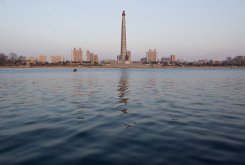News
>
Asia
N. Korea forecasts new storm damage after deadly floods
- Published: 30/07/2012 at 05:48 AM
- Online news: Asia
North Korea said Sunday it was being lashed by
severe thunderstorms that could cause major damage, just days after
flooding that killed scores and left tens of thousands homeless.
 A
general view shows the Juche Tower in Pyongyang in April 2012. North
Korea said Sunday it was being lashed by severe thunderstorms that could
cause major damage, just days after flooding that killed scores and
left tens of thousands homeless.
A
general view shows the Juche Tower in Pyongyang in April 2012. North
Korea said Sunday it was being lashed by severe thunderstorms that could
cause major damage, just days after flooding that killed scores and
left tens of thousands homeless. The second unusually detailed report on bad weather in two days will add to concerns the North's farmland has been ravaged, which could cause new food shortages in a state that struggles to feed its people at the best of times.
Following a visit to the country, UN agencies estimated last November that three million people would need food aid in 2012.
It also represents a challenge for new leader Kim Jong-Un, struggling to get to grips with running one of the world's most secretive states.
The state-run Korean Central News Agency (KCNA) said late Sunday that heavy rains and strong winds were battering the country, addng areas of Pyongyang, and North Pyongan and South Pyongan provinces were particularly hard hit.
"Torrential downpours are continuing even at this hour in some regions... it is expected that most regions will face huge damages due to the heavy downpour, strong wind and thunders," it said.
The North earlier on Sunday forecast heavy rains in most parts of the country on Sunday and Monday, particularly warning of downpours set to deluge the west coast and the northern province of Jagang.
The warning comes a day after Pyongyang disclosed that a week-long flood earlier this month had left 88 dead, injured 134, and made almost 63,000 people homeless.
More than 30,000 hectares (74,000 acres) of crop fields were washed away or submerged, with roads and factories destroyed, KCNA said.
After decades of deforestation the impoverished North is particularly vulnerable to flooding.
With rugged terrain and outmoded agricultural practices, the communist state faces serious difficulties in feeding its 24 million people. Hundreds of thousands died during a famine in the mid to late 1990s.
The United States reached a deal in February this year to offer the North much-needed food in return for a freeze on nuclear and missile tests.
But the plan was scrapped after Pyongyang's failed rocket launch in April, seen by the US and its allies as an attempted ballistic missile test banned under UN resolutions.










0 comments:
Post a Comment